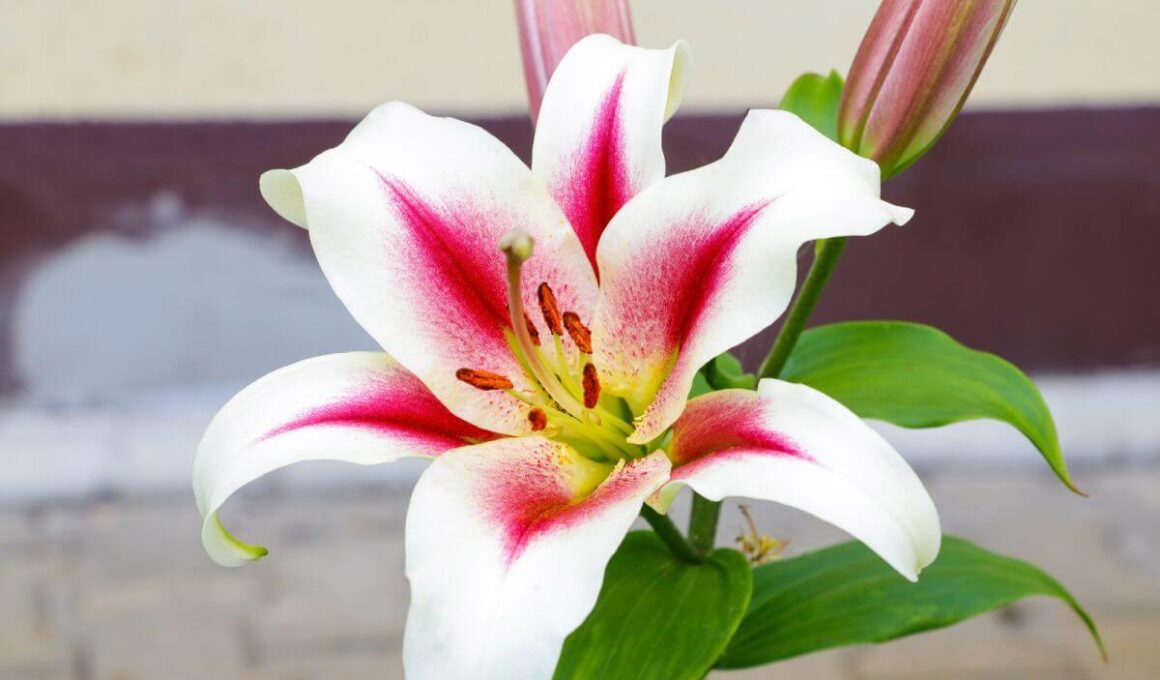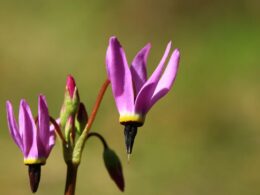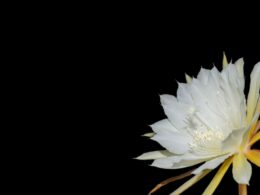Stargazer Flower: Appearance
The Stargazer lily is an Oriental lily hybrid that was first bred in the 1970s. It’s a perennial flower with showy petals that add a touch of elegance to any garden or bouquet. The Stargazer lily gets its name from its distinctive blooms, which face upwards towards the sky. The flowers are typically a deep pink or red color, with darker spots near the center.
Each flower can grow up to 6 inches in diameter, making the Stargazer lily one of the largest lily varieties. In addition to its striking blooms, the Stargazer lily is also known for its strong fragrance. This captivating combination of looks and scent make the Stargazer lily a favorite among gardeners and floral designers alike.
Stargazer Lily Flower: A Hybrid Flower
The Stargazer Flower is a beautiful but unusual plant. It is not native to any particular habitat, but is instead a hybrid created by combining two different species. The Stargazer flower is a hybrid plant that was created by crossing the Lilum speciosum with the Lilium auratum. The result is a beautiful, fragrant flower with petals pointing upwards, towards the sky. Isn’t that beautiful?
Where Does the Stargazer Flower Grow?
The Stargazer flower is a beautiful and relatively rare bloom that is most often found in gardens in the Midwest part of the United States. Due to the fact that it is a hybrid flower, it does not grow naturally in the wild.
Oriental Stargazer Lily Care
Oriental lilies are beautiful and popular flowers, but they can be tricky to care for. Here are some tips on how to keep your Stargazer flowers looking their best.
Watering Requirements
There are a few important things to keep in mind when watering Stargazer lilies. First, it’s important to make sure that the lilies are getting enough water. They require about 1 inch of water about once a week. However, it’s also important not to overwater the lilies, as this can lead to fungal problems.
Soil
Stargazer lilies require loamy soil. This type of soil is not too dense and not too sandy, and it holds moisture well. Second, the soil must be moist but not soggy. If the roots of the plant are constantly sitting in water, they will rot. Therefore, it is important to make sure that the soil drains well.
Light
Stargazer lilies do have some specific light requirements that must be met in order to ensure optimal growth. Stargazer flowers require full sun or partial shade. They need at least six hours of direct sunlight each day, but they can tolerate some afternoon shade. If you live in an area with hot summers, it’s best to plant your stargazer lilies in an area that receives some afternoon shade to protect them from the intense heat.
Temperature
Although the Stargazer flower is often associated with tropical climates, it can actually tolerate a wide range of temperature conditions. In fact, it is hardy to zones 4-9, making it a good choice for gardeners in many parts of the world.
Fertilizing
The ideal soil pH for stargazer lilies is 6.3 to 6.8. However, if the soil is too alkaline, the plant may experience nutrient deficiencies. For this reason, it’s important to test the soil before planting stargazer flowers, and to amend it accordingly. If you live in an area with naturally alkaline soils, you can lower the pH by adding sulfur or other acidic amendments to the ground.
Pruning
Always prune after the flowers have bloomed. Cut the stem just above the second node, or joint, from the bottom. This will encourage the plant to produce more flowers. Second, be sure to remove any dead or dying leaves or stems. Dead leaves can harbor diseases that can harm the plant. Finally, cut away any damaged or damaged flowers. This will help the plant to focus its energy on producing healthy new growth.
Stargazer Flower Common Pests and Diseases
Stargazer lilies are a beautiful and popular addition to many gardens. However, they can be susceptible to pests such as aphids, snails, and slugs. Aphids are small, winged insects that feed on plant sap. They can cause damage to the leaves and stems of stargazer lilies, and can also transmit diseases.
Snails and slugs are both mollusks that feed on the leaves of plants. They can cause extensive damage to stargazer lilies, and can be difficult to control. The best way to prevent problems with pests is to keep your garden clean and free of debris.
Remove any dead leaves or flowers, and rake up any mulch or compost that could attract them. You should also regularly check your plants for signs of damage, and treat them with an appropriate pesticide if necessary. By taking these simple steps, you can help keep your stargazer lilies healthy and pest-free.
How to Propagate Stargazer Flowers?
The stargazer flower is a beautiful and unique plant that can be propagated in a number of ways. One method is to take a cutting from the stem of an existing plant. The cutting should be about six inches long and taken from a healthy, actively growing plant. Plant bulbs in the early spring or fall, or potted plants at any time of year during the growing season.
Once you have taken the cutting, remove the bottom leaves and dip the cut end in rooting hormone. Then, plant the cutting in a pot filled with well-drained soil. Keep the soil moist but not waterlogged, and within a few weeks, new roots will begin to form. Once the roots are established, you can transplant the cutting into your garden or landscape.



















